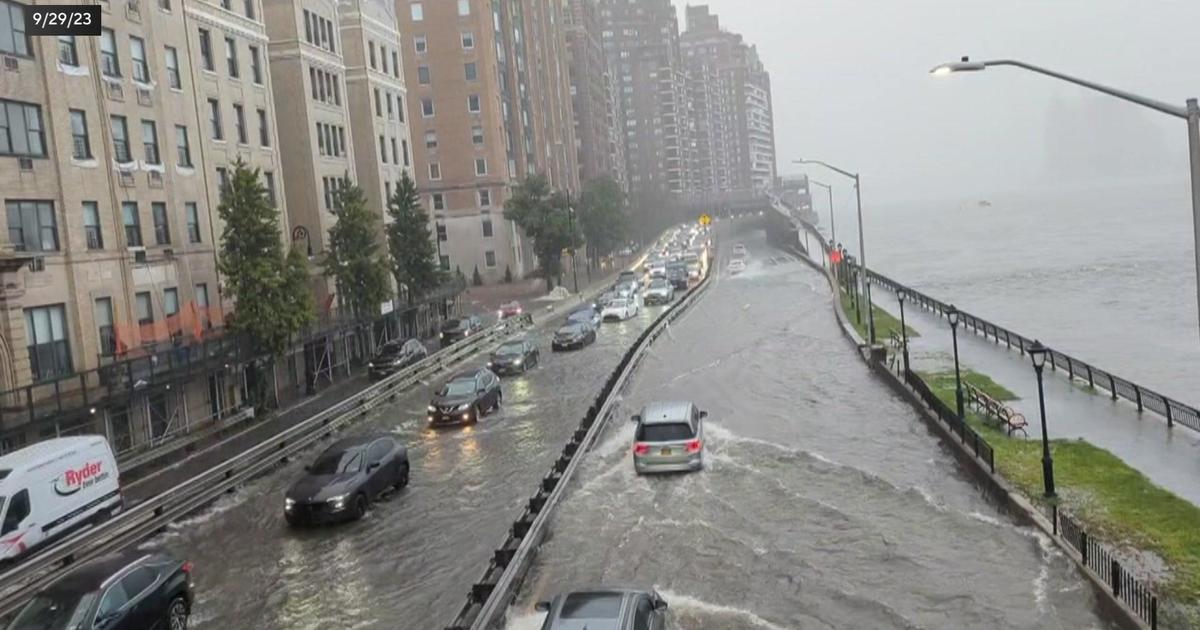Candidate Conversations: Andrew Yang
NEW YORK (CBSNewYork) – CBS2 is holding in-depth conversations with the 2021 New York City mayoral candidates.
We are asking each of them the same questions, so you can compare.
The order was chosen at random.
Here's Marcia Kramer's interview with Democrat Andrew Yang.
Marcia Kramer: From ending gun violence to recovery from the pandemic, the next mayor of New York City will have a lot on their plate. We're speaking with each candidate in an in depth conversation to see where they stand. We're asking each candidate the same question so you can compare. Joining me now is Andrew Yang. Andrew, thank you so very much for joining me.
Andrew Yang: Thanks for having me, Marcia. It's great to be here.
Kramer: So let's start with the first question. Should you get elected, what are your top three priorities on day one?
Yang: My top three priorities on day one are the things I hear most from New Yorkers: Public safety, jobs, and small business recovery.
Kramer: And, and what would you be doing in each one?
Yang: Well, for public safety, we have to get the rates of shooting and violent crimes coming down instead of going up. It's been a shocking and devastating time for far too many New Yorkers. So on the gun violence front, we have to do everything we can to try and reduce the supply of illegal firearms that are coming back into our neighborhoods. And I would inaugurate a new anti-violence, anti-gun unit of plainclothes police officers to be able to go in and work with community leaders and go into communities to try and reduce violent crimes in neighborhoods that are seeing surges. I think that police are going to be crucial to our getting our city back, really.
And I have committed to reducing street homelessness by more than 50% in my first term, in part because I think some of those, some of those people on our streets actually contribute to this feeling of insecurity that far too many New Yorkers have. And we can do this if we invest in safe haven beds, and psych beds and supportive housing. And then equip the nonprofit workers who are working with street homeless people that bring them to better situations. No one belongs on the streets of New York.
In terms of jobs, the single biggest thing we can do to to fuel a jobs recovery is get our schools open so that people can go back to work, get commuters and tourists back into the city. We're down 600,000 jobs and over 300,000 of those jobs are being supported, at least in good times, by commuters and tourists coming in and going to restaurants, even seeing a show. So we have to do everything we can to let people know that New York City is back and open for business, for celebration, for cultural events, for sporting events. If we can do that, then we can start getting our job market back towards what it was.
The third is small business recovery. I've talked to so many small business owners. I was just at an event today actually with with the Schnippers, who started five restaurants, now, unfortunately two, here in New York City. And so many small business owners are questioning whether they can or should reopen. We have to do everything we can actually make sure that they have a path forward. The fact is, if their lights go out, it's going to be very difficult in many cases to get someone else into that space. It's a much bigger win for everyone if we can help the existing small business owners manage their rental obligations, get resources to reopen, and in some cases, access resources that they might not even have known existed. From federal programs in certain neighborhoods in New York City, they actually have been able to access a lot of the things that they should be able to.
Kramer: So Andrew, how do you square reducing the size of the police budget, which by the way, the city has already done, with the need to keep the city safe and to end gun violence?
Yang: Well, I'm not someone who believes that somehow defunding police is the answer. I do think that we need to increase the funding to communities in various forms. In the form of jobs, education, mental health resources, health care. But we have to get our neighborhoods feeling safe again. And we have to deploy police in a way that actually leads to that result.
Now, one of the things that I think is a bit of an issue, when we talk about these problems, Marcia, is that we think, hey, if we have more money and more things, then we'll solve the problem with less. The fact is right now we have over 35,000 police officers. We just need to be able to deploy them in a way that actually increases public safety, and brings crimes crimes down and clearance rates up. So it's not about somehow defunding it's about deploying the resources we have in a way that actually start solving the problems that we're seeing around us.
Kramer: Well, if you were elected, would you cut the size of the NYPD budget?
Yang: That's not something I'm looking at doing. Again, like, we have to get crime rates under control, we have to get our sense of security up. And that's what I'm focused on. I think that's what most New Yorkers are focused on.
Kramer: Do you think the budget cuts exacerbated the problems of violence and keeping the city safe?
Yang: Again, Marcia, like, you know, I think that kind of thinking is one of the things that gets us into trouble. I mean, there there are issues where, you know, resources aren't being used in a way that are actually solving the problem. And the budget cuts you're talking about, most of them weren't actually real in terms of their their impact on police practices, which, you know, isn't necessarily something we should be troubled by. It was mainly an accounting move. So I don't think that it's had an impact in the way you're describing.
Kramer: So Alexandria Ocasio-Cortez said that one of her prerequisites for endorsing a candidate, is they agree to cut the size of the NYPD budget by $3 billion. I wonder if you want her endorsement?
Yang: Well, I certainly wouldn't satisfy that prerequisite, though it still wouldn't keep me from, you know, having a conversation. There are people I disagree with.
Kramer: So another question is this. The police commissioner argues that bail reform has to be changed so that judges feel they have they have the ability to keep people accused of terrible crimes in jail, or at least set bail for them. I wonder how you feel about that? Do you agree, disagree?
Yang: Oh, this is something we have to look at. I'm a data driven guy. And so we have to look at the information on whether folks that have been released and without, you know any issue, like, then go on to pose a threat to public safety. And so if we find that that's the case, and that changing these rules might help, that's something we should absolutely consider.
Kramer: But you'd have to go to Albany to get it done. Would that be a difficult thing to lift?
Yang: Well, you know, I think that in this case, legislators will be very responsive to issues that impact public safety. And one of the big issues we've had over the last number of months and years is that there hasn't been a productive, constructive relationship between the mayor and Albany, And that has to change the job. The mayor's to deliver for the people of New York City. And if any relationship's going to help you do that, then you have to make that relationship work. I'm very confident that the folks in Albany would listen if the people of New York City wanted to examine a rule that they thought would improve public safety.
Kramer: So the number of homeless people in New York is really out of control. I wonder what you think the answer is? And do you think putting a homeless shelter or should you should put a homeless shelter in a residential neighborhood? If the people don't want it?
Yang: I'm so glad you asked this question, Marcia. Because this is something I'm very passionate about and deeply committed to. There is no reason why someone should be sleeping on the street in New York City. It's not good for them. It's not the right environment for them. It's bad for the economic recovery, and at the margins, it's bad for public safety. And we can absolutely reduce the street homelessness population by 50% or more in my first term.
When you dig into the numbers, the last count of street homeless people was 4,000. But that's only a snapshot in time. Over any 12 month period, that number gets multiplied by four and a half. So you're looking at between 4,000-18,000 people on the streets of New York in any given period. So to get that number down by a half, you need to get 2,000-9,000 people off of our streets and to safe haven beds, psych beds, supportive housing, or shelters. And this is doable.
I've talked to the workers who actually interact with people on the streets every day. And they say that they used to have a different standard, where if someone was in distress or mentally ill or unconscious, or inebriated, then they were brought to a hospital and given medical attention for a couple of days, and then sometimes given medication and brought to another environment. We can absolutely do this in New York City. It's just been a policy and leadership failure.
In terms of having shelters, in different neighborhoods and communities, we have to do a better job of trying to put people into sustainable situations. That's why supportive housing is such a great approach. Putting them into temporary housing, in residential neighborhoods is not a good long term approach. It's a stopgap at best, and we should try and avoid that.
Kramer: But you know, putting people, getting people off the streets and reducing the number of homeless people has been a goal of the De Blasio administration for the entire time. He's put out numerous reports, but it hasn't been accomplished. So when you say it's doable, how would you do it differently than it's being done now?
Yang: Well, again, there's been a different standard of intervention, where right now, Marcia, if someone's on the streets of New York City, and then you go to them and say, "Hey, do you want to come with me to a shelter?" And then they say no, then they stay on the street. And I don't think that's the right standard. I think that if the person is in distress or mentally ill or inebriated or chemically dependent or has some other issue, then we need to get them help. And if you have that standard, then you actually can get them to a better environment, very, very often. I've talked to the people who are doing this work, and they say that their standards have changed. And we need to change them to something that's better for us in the city as well as the people involved. But this is very doable. This has just been a policy leadership failure.
Kramer: So people who send their kids to charter schools really love them. I wonder what your position is on charter schools? And also what would you do in terms of dealing with the Jewish parochial schools who sometimes been accused of not giving enough secular education?
Yang: I believe in any school that's working for our kids, Marcia. I'm a public school parent myself, one of my boys is in kindergarten at a public school. The other is autistic, and in a special needs school. And so if a school is delivering results for our kids, then we should applaud it and try and build on that success. And that's true, whether it's a charter school or public school, we should be trying to do whatever is working for our kids.
And that's true also, in terms of the Jewish parochial schools, I visited a number of these schools and the community members there have invested a ton of energy and resource in educating their kids in a way that that they think is best for them. And it's something that I'm frankly grateful for. You know, the city actually is spending a lot less money on those schools, in part as a result.
Kramer: I wonder what measures you would put in place to ensure there's no sexual harassment in a Yang administration?
Yang: Well, there would certainly be no tolerance for any sexual harassment in my administration. My wife, as many of you, as you may know, Marcia was a victim of sexual assault and violence herself. It's something I feel very deeply and personally. And I will certainly lead by example, in the sense that, you know, that there'll be zero issues where I'm concerned and my team will have the same standard.
Kramer: So given ranked choice voting, who would you urge your supporters to choose in second place?
Yang: Andrew Yang's second choice on my ballot will be Katheryn Garcia, who has been a tremendous operator for the city's delivered a lot of value, run the Department of Sanitation, among other roles, I think she'd be a fantastic choice. That's my second choice.
Kramer: So we've come to the portion of our broadcast that we call "in one word." So in one word, what do you consider your best leadership quality?
Yang: Balance.
Kramer: In one word, friends and family would describe you as?
Yang: Positive.
Kramer: What's your favorite comfort food?
Yang: French fries.
Kramer: Two words, but I give it you.
Yang: Oh, yeah, that is two words. I guess I could have said fries, Marcia.
Kramer: Kidding. I'm kidding. I'm just kidding with you. So name a unique skill or talent?
Yang: Unique. The first thing that came to my mind, and I'm not even very good at it, is making impressions. You know, I sometimes try and make my wife laugh with impressions of other people.
Kramer: I'm really tempted to ask you to do it, but I'm not going to. OK, last but not least, you'd like to do this when faced with a difficult situation?
Yang: When faced with a difficult situation, I try to put myself in -- so the first thing that came to mind is that I'm having a conversation with someone and I like to put myself in their shoes, try and figure out what they're thinking and feeling.
Kramer: Well, we've come to the end of the questions. So thank you very much, Andrew Yang for joining us, and I really appreciate it.
Yang: Thanks, Marcia. I hope I can see you in person sometime soon.
You can watch our New York City mayoral debate with leading contenders on CBSN New York and on CBS2 hosted by Kramer and Maurice Dubois on Thursday, June 10 at 7 p.m.



